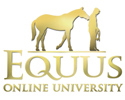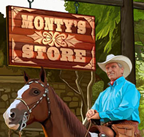← back
Horse Behavior and Training
Head Flicking

Rewards
Subscribe to Equus Online University and become a part of Monty's worldwide mission to leave the world a better place for horses and for people too.
Students automatically gain access to special rewards, such as exclusive discounts at the Monty Roberts Online Shop. Visit Monty Roberts Online Shop.



You have probably done this already, but all I can think of off-hand is: check for a place where the head collar is uncomfortable for her!
Could be it presses against a sore spot on her head (insect bite, chaffing, other hard to see abrasion/edema, tick..) , is too tight in the sides or on the poll, hangs too low down on her muzzle (my horse hates that!), or too high! , sore tooth/gum/inside of cheeks. Maybe the material of the head collar is too hard or been treated by something that either itches, stings or smells bad to her.
Horses usually shake their heads to get rid of things - flies, itchiness, allergies, fly-veils, ill-fitting things. You don't say if she is a young or old horse and whether or not she is new to a head collar or has had one before - and, if so, how that worked.
Since she doesn't shake her head at any other time I would rule out over sensitiveness to pollen and other things that get up their noses and can cause "head shaking syndrome".(In that case Nostril-Vet and a nose net might help.)
Aurora is 9. We have had her for just over 3 months. She isn't new to a head collar and I don't believe she did the head shaking for the first 6 weeks that we had her.
She does it both with a head collar and with her bridle. The head collar is definitely not too tight but sometimes the head collar is on quite loose so I can try to ensure it is not to loose in future. The bridle on the other hand fits correctly so wouldn't be loose. Its quite frustrating when she is flicking her head and your are on a hack.
Ive had the dentist to her just last week so that isn't the problem. She did need a couple of sharp teeth filed but the head flicking is still the same after his visit.
Do you think it might be linked to being in season. Strange question I know but only seemed to start this once she started coming in to season.
Not saying this applies to you and your horse, though!
http://www.thehorse.com/articles/38493/is-it-my-horse-or-is-it-me?utm_source=Newsletter&utm_medium=behavior&utm_campaign=06-04-2017
The excerpt is from a larger article called ""Is it my horse, or is it me?" I think yu should all look at it. Has some very good points and food for thought in it.
The other issue that comes to mind is she could have pull-back problem and has strained part of her neck from the force of that pull-back. There is such a tremendous force exerted on the poll and neck when this happens to a horse. This is soft tissue for the horse and would take some time before the soreness would disappear. If this was the case, the massaging would be very soothing for her.
You mentioned that you and Aurora have only been together for 3 months and she is nine yrs old. That leaves a great deal of time in her life that she was NOT with you. These horses are great at masking their pained areas of their bodies. Talk to her and listen carefully, she might give you a clue as to what`s going on in her world.
At any rate, give some of these exercises a go and see what takes place for her;
Good luck with your search,
All the best
Bud
Great advice from everyone and it is good to be back. Just adding my bit ;D
From watching a horse that we are currently rehabilitating who flicks his head upwards as if in a nodding type method, on watching video back in slow motion he is trying to release tension around his scapular area and pectorals so try not to focus just on the head but where the muscles connect to the body.
Flicking from left to right it is working the brachiocephalic muscles down the sides of the neck which pulls into the shoulders to the humerus helping pull the scapula forward and swings the foreleg forward. Saddle check to ensure Aurora is not restricting movement and when riding remember to keep light of hand, a strong hand will cause tension in the neck muscles which will have a knock-on effect on the body. Carrot stretches to help release any tension in the shoulders.
It's all about the horse!
Mel
x
I have a similar issue with my new little mini. She is 4 yrs old and has had little training so far. I have only been doing ground work with her so far, and with the different exercises such as side passing or learning to give to the rein on either side, she is doing really well. The moment I ask her to lead, however, she starts with the head flicking. She hadn't learnt to lead before I got her, and I am yet to put the work in there, but feel with her it is a matter of being educated to lead. Her resistance becomes more pronounced if I lead her in the opposite direction to her food bowl (a big no no for her!), if I lead her on the off side, or when I ask for a halt. The more a work with her the better she gets, but it seems to me she just hasn't learnt it yet. Maybe yours is similar? I would be interested to follow what happens with Aurora and what seems to help with her. Will let you know what helps mine when we figure it out too.
All the best.
Mel
x
How does this come about? The answer to this will be found in the lessons on the uni. It will require much study to become proficient. You will find that there is NO one way to achieve this. The WAY, YOUR WAY, will be hiding in your thoughts and your belief system that will probably need some tweeking as new information makes itself known to you. This is where the journey really becomes interesting. You will grow expotentially in how you see the world. This is the hidden gift that horses bring to their humans, and it is a gift for sure.
The Bedouins, in the middle eastern culture, have been training horses for thousands of years. Their number one most important training issue was to train the young foals to come to them on command whenever they called. without fail. The young children would do this in their tents and while the foals were young. They built, within the young horse, a strength of bond that would last a life-time for the horse and their human caretakers. Later on, when ridden, If a horse would leave the company of their human while in the desert, the result of that would mean certain death for the human. The horse, for the Bedouins, brought them the gift of exploration and trade. It seemed to be a good trade-off as the horses could depend on some aspect of feeding and nourishment from their humans for their allegiance to their horse-masters. I write this as a potential goal of training of what could be achieved with a consistent march toward mastering the relationship between horses and mankind.
Get into the mind of the horse and plant the seed of RESPECT, but try to do so with a level playing field for both the horse and the human.
Best of luck with your studies
Bud